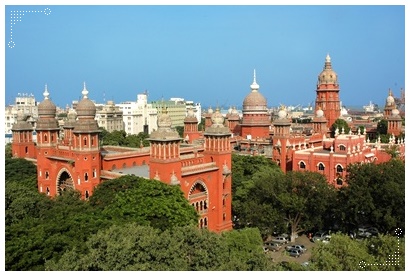Madras High Court Directs For Exhumation & Re Burial Of Body Dr Simon Hercules CoVID 19 Victim As Per Christain Rites

The Single Bench of Justice Abdul Quddhose, Madras High Court has recently directed the Commissioner, Chennai Corporation exhume the body of the deceased, Dr Simon Hercules from Velangadu Burial Ground & re bury available remains at Kilpauk Cemetery upon a plea filed by the deceased’s wife claiming of her husband being buried in an inappropriate place without observing the Christian ceremonies, the faith to which the petitioner and her husband belonged.
“There is no legislation in India dealing with cases where family members seek for exhumation of the dead body for the purpose of burying the same and for performing the ceremonies in the place meant for their religious faith. Therefore, this Court will have to necessarily step in to protect the fundamental right of the petitioner and her family members for giving a decent burial to Dr.Simon Hercules (Covid-19 victim), who is none other than the petitioner's husband and an apt person eligible for the said right.”, the Bench remarked.
In the present matter, the deceased’s corpse, a CoVID 19 victim was buried in a place where people belonging to another faith were buried due to the objections raised by other human beings. The deceased’s wife (petitioner) through a representation sought for exhumation of the body & requested for burying his body at a Christain Burial Ground which was rejected vide order dated 24.02.2020 on the ground that it was not safe to exhume the body & bury the same at a different place. Thereafter, aggrieved by the order the petitioner approached the Court for issuance of writ of certiorarified mandamus calling for records connected with the impugned order, quash the same & direct the Commissioner, Chennai Corporation to make necessary arrangements to exhume the body of Dr.Simon Hercules Hercules and bury the same at Kilpauk Cemetery.
The Petitioner’s Counsel Covid-19 guidelines on Dead body management issued by Government of India, Ministry of Health and Family Welfare, Directorate General of Health Services (EMR Division) dated 15.03.2020, WHO guidelines for Covid-19 infected dead bodies dated 24.03.2020 & report of the South African Ministerial Advisory Committee on Covid-19 dated 25.01.2021 to submit that dead Covid- 19 bodies were not contagious & that Covid 19 could only be transmitted through droplets. It was also submitted that at the time of burial, there was no priest to conduct the burial & that no religious prayers or songs were sung at the place of the buried site.
The Court placed reliance on the Apex Court judgements in Pt Parmanand Katara v. Union of India 1995 (3) SCC 248, Ashray Adhikar Abhiyan v. Union of India 2002 (2) SCC 227 in which it was observed that it was the State’s obligation to give a decent burial of a deceased person as per his religious beliefs. Further, the Court also relied on the judgement of this Court in S Sethuraja v. Chief Secretary (WP MD No 3885 of 2007) in which it was observed that in our tradition and culture, the same human dignity (if not more) with which a living human being is expected to be treated is also extended to a person who is dead.
The Bench also took note of the existence of legislative vacuum in matters of exhumation to enable the deceased’s family members to perform their religious ceremonies and to bury the dead body at an appropriate place of their choice is concerned, there is a legislative vacuum.
“Even though under Section 176 Cr.P.C and Section 174(1) Cr.P.C, the Magistrate and the Officer-in-charge of the Police Station are having the powers to order for exhumation, those cases do not deal with the case on hand, where the buried person or his family members are not involved in any criminal offence.”, the Bench observed.
Thus, the Bench while quashing the order dated 24.02.2020 directed the Commissioner, Chennai Corporation to exhume & re bury the body in the presence of petitioners & her family members who were at liberty to perform all religious ceremonies within a period of two weeks from the date of receipt of order by strictly observing the following conditions:
(a)The Health Officer nominated by the fourth respondent shall be present and supervise the exhumation. This is to ensure that all procedures are complied with and everyone present shows respect to the deceased person at all times and public health is protected.
(b) During the exhumation, the Health Officer shall ensure that the correct grave is opened.
(c) The Health Officer shall also supervise the re-burial at the Kilpauk Cemetery.
(d) The exhumation should start as early as possible in the early morning to ensure maximum privacy.
(e) Screens should be placed around the existing grave/burial plot to protect the exhumation from public view and to guarantee privacy. If necessary, an area of the graveyard is cordoned off from public view to ensure privacy.
(f) Workers must treat the neighbouring burial plots with care.
(g) Disinfectants and disposable protective clothing (including respiratory facemasks) must be available to workers and disposed of safely after the exhumation.
(h)All remains and pieces of casket, webbing etc., are placed in the new casket (shell).
(i) All Covid-19 protocols issued by the State and Central Government from time to time shall be strictly followed.
(j) Sufficient Police protection shall be provided both at Velangadu burial ground and Kilpauk Cemetery for the smooth operation of the exhumation and the re-burial process.
(k) Videography of the exhumation and reburial process shall be done
“The death of a spouse ends the relationship but does not sever all relational bonds. The sense of being connected to the lost figure persists, sometimes exacerbating a sense of having been abandoned, sometimes contributing to a sense of continuing in a relationship, although with an absent partner” , the Court also remarked.
Case Title: Anandhi Simon v. The State of Tamil Nadu| W.P.No.7620 of 2020
